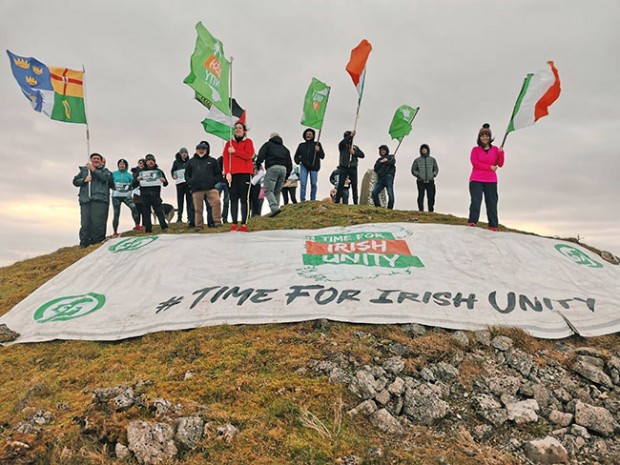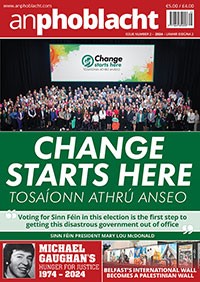29 February 2024 Edition
Having your say on the future Ireland
The Commission on the Future of Ireland – A year of listening, discussing and letting people have their say

The past year has seen Sinn Féin’s Commission on the Future of Ireland initiate a mammoth grassroots consultation with the people of Ireland.
I have been ‘on the road’ with the Commission and want to share what’s been learned through the People’s Assemblies and other public events, and where the discussions on constitutional change currently sit in the public discourse.
I have attended almost all of the events organised under the auspices of the Commission. Each event is unique and has its own local flavour, but every event has presented an impressive panel of guest speakers and been attended by people from a broad range of backgrounds.
Our People’s Assemblies are characterised by the huge level of interaction between the panel, chairperson, and audience.
These are not intended to be meetings where the audience sits passively listening to what the panel says. The theme of these meetings is ‘Have Your Say’ and right from the outset the audience is encouraged by the chairperson play an active part in the meeting. Often, more time is devoted to hearing contributions from the floor than what the panel might have to say.
The result is a free flowing, interesting, and genuine exercise in participatory democracy. Through these fluid meetings, I have listened to deeply personal contributions from speakers who have been empowered to articulate fears, hopes, vulnerabilities and frailties.

Many times, I felt the white heat fury at how people are being treated. In the Ireland of 2024, your life experience will be largely determined by the economic circumstances you’re born into.
Disability rights activist Mo Farah attended the Donegal People’s Assembly. He addressed the meeting saying, “I recommend the future united Ireland will remove the barriers for people with disabilities and make it inclusive for all people within the country.
“I am a migrant person and I come from Somalia, we are war torn and there is fighting and conflict and everyone who is coming to this country are not coming to relax.
“I left when my life was threatened. I had a good life in my country, I had a car, I was leading a big organisation which advocates for people with disabilities and elderly people.
“The reason I come here to Ireland, to join the people of Ireland is to survive myself. So, I think we need the future of United Ireland to make sure that every person has a right to make a better life in this country.
“I know you are already assured of some kind of equality because I am here. I am a migrant, I’m black and I’m also disabled using a wheelchair. So, what I have seen so far is positive because I was invited here to speak in front of you, to listen, to contribute and that’s what you want Ireland to be in the future. Thank you so much.”

I don’t know any more about Mo than what he offered to the meeting, and I don’t doubt that a wheelchair user who has managed to make the journey from Somalia to Ballybofey was probably not too perturbed, but I can appreciate that Mo made an effort to attend and address the Donegal People’s Assembly.
His example of active citizenship stands as an example to us all. All of the People’s Assemblies have focussed on the potential economic benefits of Irish unity. There is no doubt that an all island economy, operating inside the European Union, would be stronger than the current two-tier arrangements.
However, at the Armagh, Down, and Louth People’s Assembly, Matthew Carville had a different way of looking at things, saying, “Growth for growth’s sake is not a suitable instrument to measure quality of life. In a united Ireland we must look at some of the other crises around us including the climate and ecological crises. It’s biophysically impossible to sustain an economic growth system based on a finite eco system. We can’t sustain a united Ireland on a dead planet.”
It put me in mind of comments made by the then Taoiseach Enda Kenny around 2012, that Ireland was ‘the best small country in the world to do business’.
These words may well have been accurate, but what’s the point of being a great place to do business when children are waiting five years to fix a scoliosis? Shouldn’t a buoyant economy make things better for people?
The new united Ireland has to be about much more than a flourishing economy. Of course, that’s important, vital even, but the gains made have to be used to make life better for everybody. That will be the measure of our new national democracy – that it delivers for the vulnerable and leaves nobody behind.
In October 2023, the Commission hosted an event in Derry entitled ‘Exploring Northern Protestant Culture and Identity’. This was a more intimate meeting and the first Commission event in which the Chairperson and panellists were all from the Protestant section of our people.
It was a unique event because it was an all-female top table, neither of the two panellists were in favour of Irish unity and they openly challenged some of the decisions made by Sinn Féin councillors locally.
I found it exciting that these women, all community workers, felt comfortable and confident enough to do ‘a bit of giving out’, albeit in a wholly respectful way, at a Sinn Féin meeting.
And I listened intently to what they had to say, because, in the North, it’s rare to get the opportunity to hear a viewpoint that’s the opposite of your own, delivered in a calm, coherent, dignified and sensible manner. The Twitterati might shout the loudest, but they haven’t got the most to say.
Catherine Cooke stated that she loves the 12th July events and watching the parades saying, “I equate going to the parades with going to a GAA match, we meet up and speak to other families.”
She said parades and bands are a big part of her life, with her husband, grandson and daughters all taking part. She said her mum used to knit Union Jack cardigans for the parades, “Like you do for St Patrick’s Day”.

Allison Wallace said that “Irishness is seen as a threat to Britishness and I’m sorry that this has happened. The main challenge is positive leadership; I am fed up with men shouting ‘No’.”
Allison went on to say that she is not bothered about the Windsor Framework as she is more concerned that her daughter is waiting on an autism ASD assessment for the past two years, due to the stalemate and no functioning government department.
If Sinn Féin is about building a new republic, then the Orange tradition has to have a place in it. The identity of British people from the North has to be respected and those customs, language, and heritage of the Ulster Scots should be celebrated and respected.
For me, the decision by the Commission to give space to alternative voices is one of its greatest strengths and is a true measure of confident political leadership.
In 2024, against a backdrop of relentless elections across two jurisdictions, the Commission will continue to do its work.
There are People’s Assemblies planned to take place in this country and also in Canada and North America.
There is no end date for the Commission. These conversations need to keep happening and I hope that as long as people are talking, Sinn Féin will continue to provide this space for them to do so.
Emma McArdle is a Campaign and Policy Manager on Sinn Féin’s United Ireland Project




